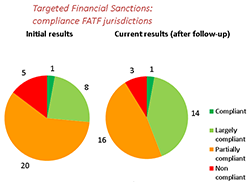Roger Wilkins AO, higlighted the lack of compliance with targeted financial sanctions requirements at a briefing to the United Nations Security Council Counter Terrorism Committee on 18 December 2014.
Madam Chair, Ambassadors, ladies and gentlemen, colleagues.
This is the .
Over those 25 years, FATF has grown in size from 7 countries to include directly or indirectly almost 200 countries.
The scope of its work has expanded from concentrating on money laundering from drugs to include all forms of money laundering, taxation issues, corruption issues, and – most importantly for you – countering the financing of terrorism.
The aim of FATF is to help protect our citizens and our societies and economies from the harm caused by crime and terrorism, and to prevent these things from occurring by cutting off and preventing the flow of funds and proceeds that are the life blood of crime and modern terrorism.
FATF does that by setting standards that member countries need to meet in their domestic laws, institutions and practices. We then hold our members to account by carrying out peer reviews either directly, or through our eight regional bodies.
In a world where borders are becoming less and less relevant, and where there are fewer constraints on the movements of goods, capital and people, this task of setting and ensuring the uniform and consistent implementation of standards across the world is critical.
As you know, this is especially true in the area of the financing of terrorism. The FATF standards incorporate financial aspects of your resolution 1373 in our Recommendation 6, which also contains elements of resolution 1267.
We have begun a new round of assessments that shifts the focus from the question “have countries complied with the FATF requirements” to a new question “has the country implemented the FATF standards to effectively stop or mitigate the laundering of money and the financing of terrorism?”
We have shifted our focus from technical compliance to effectiveness. It is not enough to pass laws and set up agencies and institutions – they also need to work effectively to get results.
It is important for you to understand this shift, and the significance of this shift because we need your help on a number of levels in rolling out this very ambitious programme.
I will come back to how we can collaborate better a little later.
But, let me give you a few important facts and figures drawn from our previous round of country assessments.
Remember, this previous round, which has just concluded, looked only at technical compliance with standards. And, some of these standards incorporated requirements of your resolutions dealing with terrorism financing.
These numbers are a concern. I let them speak for themselves. Remember, that we at FATF have no real sanctions as such for non-compliance. The key incentive is peer pressure. There may well be practical implications for countries that fail to meet standards egregiously. They might find themselves excluded from the international payments system, with implications for their banks, business and citizens. And, we have seen something of that phenomenon recently through the actions of primarily U.S. regulators.
But, as far as FATF is concerned, it comes down to peer pressure. So, why are these numbers like this? Why are a significant number of countries failing to comply with targeted financial sanctions? And, what can we do about this?
There are, I would speculate, a number of factors.
The old FATF standards were, to some extent, unclear. Countries tended to confuse the freezing and confiscation of criminal assets, and the freezing of terrorist funds and assets. They are not the same thing, as you know. Targeted financial sanctions under your resolutions require no proof or suspicion of a predicate offence. But, unfortunately, many countries have tried to use the devices of criminal confiscation to do duty for targeted financial sanctions. The revised FATF standards that we are applying in this new round of assessments make it clear that that way of proceeding is not acceptable.
I think some countries wrongly think that if they have not been the victim of terrorist attacks, they really do not have to worry too much about terrorist financing. Apart from this being a rather naïve belief in a world of international terrorism, it is also irresponsible. In a global system, everyone’s institutions and practices are relevant whether or not terrorist attacks occur on their soil. As you know only too well, under our new standards, countries will need to do a proper country risk assessment that looks at the potential for it to be involved in illicit financial flows that may affect other countries or regions.
A third factor, I think, is that some countries are reticent about implementing a robust regime on the basis of concerns about human rights. Our standards clearly say that human rights, the rule of law, and innocent third parties need to be respected in giving effect to targeted financial sanctions. But, I do think we need collectively to do more work on demonstrating how to do this.
In my view, it is dangerous to pretend that there is no tension between creating secure societies and creating just and open societies. But, it is more dangerous to believe that there needs to be some sort of trade-off between human rights and security. People at both ends of this debate, in my view, have got it wrong.
As I said, though, there is not much point in having an abstract high level debate. We need to come up with practical, concrete systems that demonstrably work, without compromising legitimate values and rights. Our mutual assessments will require that of countries not just for targeted financial sanctions, but also when we assess the implementation of our requirements to protect non-profit organisations from abuse by terrorists.
So what are we doing about this?
Under our The FATF Recommendations, we have revised the language to make it clear that countries will need to put in place general prohibitions on providing funds or assets to designated organisations or individuals. And, we have issued revised guidance papers.
As I already explained, the new round of evaluations will focus on effectiveness. Two of the eleven critical outcomes we will be focusing on directly relate to targeted financial sanctions.
As a consequence, countries that fail to effectively implement targeted financial sanctions are likely to find themselves in “enhanced follow up”. Now, “enhanced follow up” is a much more demanding and intrusive process of accountability for countries who fail to meet a certain number of standards. They are required to come and report to their peers on improvements and progress at each Plenary until they fix their problems.
What more could be done about this?
I think there are a couple of things that the United Nations could do to help. I throw these out as suggestions.
CTED and the panels of experts are already doing country visits and providing technical assistance. They make findings of compliance. You should consider publishing the results of these assessments and making these public as we do at FATF, and as our regional bodies do. That would increase the political and perhaps the market incentive to comply.
As I have said, our FATF standards essentially embody the financial aspects of sanctions resolutions. When FATF is doing mutual evaluations, we seek and incorporate the comments of CTED and the panels of experts. The United Nations should consider also doing the reverse. When CTED is doing a country assessment, it should be allowed to seek comments from FATF and incorporate these comments where they find them relevant.
There are a couple of practical things that would, I think, increase incentives to comply and improve the efficiency of both our processes.
I should add that I and my colleagues would be very happy to look at any ideas and suggestions that you may have that may help improve the situation.
Let me conclude by saying a few things about ISIL funding.
FATF at its last Plenary followed the United Nations lead on this critical issue, and has set up a project team of its members to look at the sources and methods of ISIL funding.(1) That team is led by Turkey and the United States.
It is too early to give you a read out on the findings or suggestions from this work. I just want to make three points.
First, it is clear that ISIL represents a new form of terrorism where funding is central and critical to its activities. ISIL is effectively running an army. It will need to maintain the supply of complex and sophisticated material. That takes money. A lot of terrorism has not been that dependent on finance and has not needed that sort of funding. As far as ISIL is concerned, if we would strangle off the ability for them to get material, then we should be able to comprehensively defeat them.
Second, I do not want to raise expectations about what we will be able to find out or what we will be able to say publicly on this topic. Estimates of funding have been floating around in the media about how much ISIL needs, and how much it has or gets. We may not be able to give clear and definitive answers to these questions. Nor may we be able to give definitive answers to the methods and sources of funds.
Third, this is really a new sort of function for FATF – auspicing this very specific type of inquiry. In a world where issues and problems are increasingly global and regional, not confined to a particular country, there is a role for FATF to do or aspire to this type of activity.
Thank you for your attention, and your ongoing assistance and cooperation.
Related documents:



 Twitter
Twitter
 Facebook
Facebook
 Instagram
Instagram
 Linkedin
Linkedin
